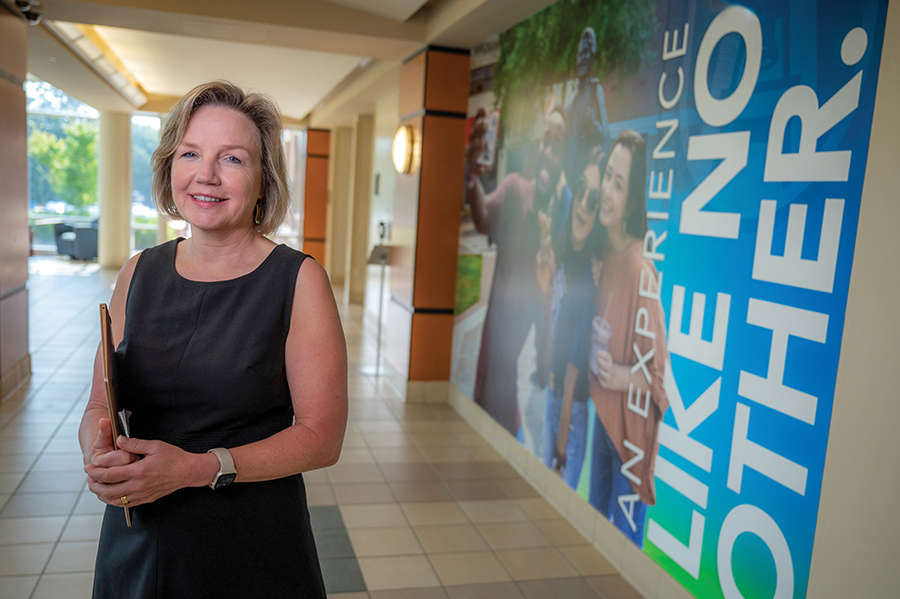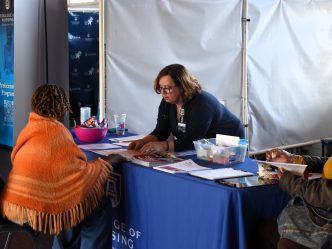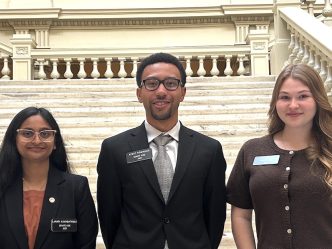When Teresa Waters, PhD, set foot on campus at Augusta University to officially assume her role as the inaugural dean of AU’s proposed School of Public Health on Aug. 1, she not only stepped into a huge undertaking but also into what she sees as a great opportunity.
It’s a major undertaking because she is charged with consolidating AU’s foundational public health pieces into a unified identity and goal.
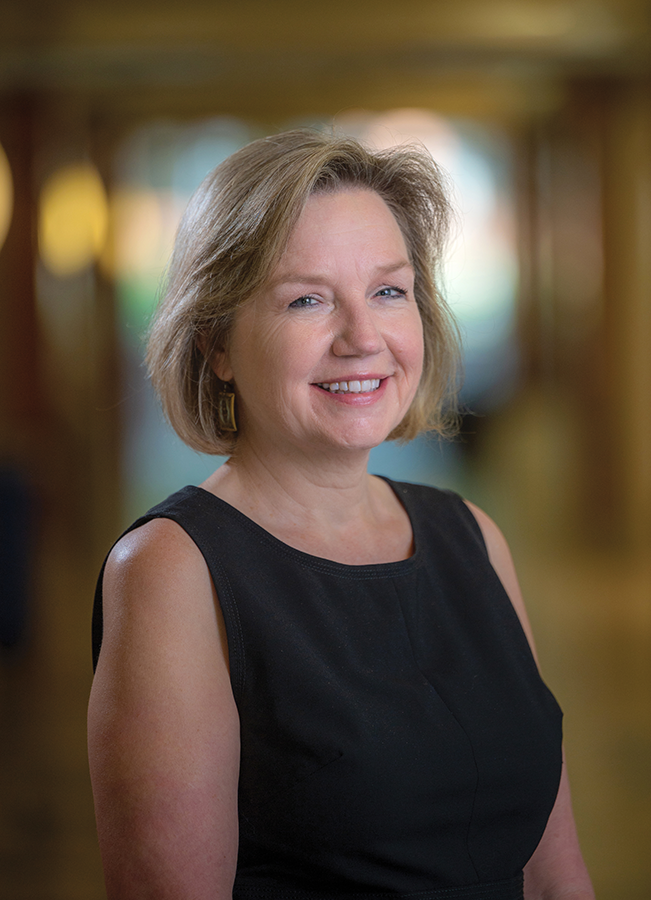
“It’s a fabulous opportunity, and it’s going take a little bit of hard work. We’re bringing in wonderful people who love public health from various units, but now, we need to come together and say, ‘We are the School of Public Health’ and really dive in to create a shared identity,” Waters said. “This is an opportunity and a challenge. There are some changes coming that everyone will love, but there will also be changes that not everyone appreciates. And that’s OK. We’ll talk through it and figure it out, but that shared identity of becoming a new school is really going to be worth it.”
Augusta University was already home to the Institute of Public and Preventive Health (IPPH), the Center for Rural Health and the Center for Bioethics & Health Policy. Then there were the educational pieces. IPPH offered a CEPH-accredited Master of Public Health degree and the College of Allied Health Sciences offered a PhD in Applied Health Sciences, while the Medical College of Georgia’s Department of Population Health Sciences has traditionally housed multiple quantitative graduate programs.
The consolidation will bring seven programs under the School of Public Health’s umbrella, including the Master of Public Health, as well as Master of Science degree programs in biostatistics, clinical translational science, data science and epidemiology. The final two programs are Doctor of Philosophy degree programs in biostatistics and applied health sciences.
While it’s a lot to digest, Waters already knows she has the resources at her disposal to make it happen, including faculty and staff who were already familiar with the many moving parts.
“Everybody that’s coming into the school will be able to build on the great work that was already being done. By bringing us all together under one roof, we can enhance each other’s work and continue to grow,” Waters said. “In the area of research and community engagement, we are inheriting a strong infrastructure through IPPH. In the new school, more faculty and staff can take advantage of that infrastructure, allowing the SPH to grow its footprint and impact.”
One of the first pieces of the puzzle was naming a leadership team, which includes Jie Chen, PhD, Gianluca De Leo, PhD, Aaron Johnson, PhD, and Bobbie Willcox. The identification of Chen, De Leo, Johnson and Willcox was facilitated by Augusta University Executive Vice President for Academic Affairs and Provost Neil J. MacKinnon, PhD, with assistance from Amy Abdulovic-Cui, PhD, associate professor of biological sciences, Vishal Arora, MD, professor in MCG’s Department of Medicine, and Jennifer C. Sullivan, PhD, dean of The Graduate School.
“Under the provost’s leadership, there was a large planning process that set things up well, thinking through many of the building blocks that needed to be put into place to build a school of public health. Part of that process included recommendations for the structure of departments, who would go in those departments, and what educational programs might move. The recommendations also included some suggestions of who might serve in interim leadership roles,” Waters said. “That was so helpful to me because I really didn’t know anybody that well. Appointing interim leaders allowed me time to get to know people before making more permanent appointments. And I am so grateful to these leaders! They have really stepped up to serve. We are growing together as a leadership team, and it’s been a fantastic experience.”
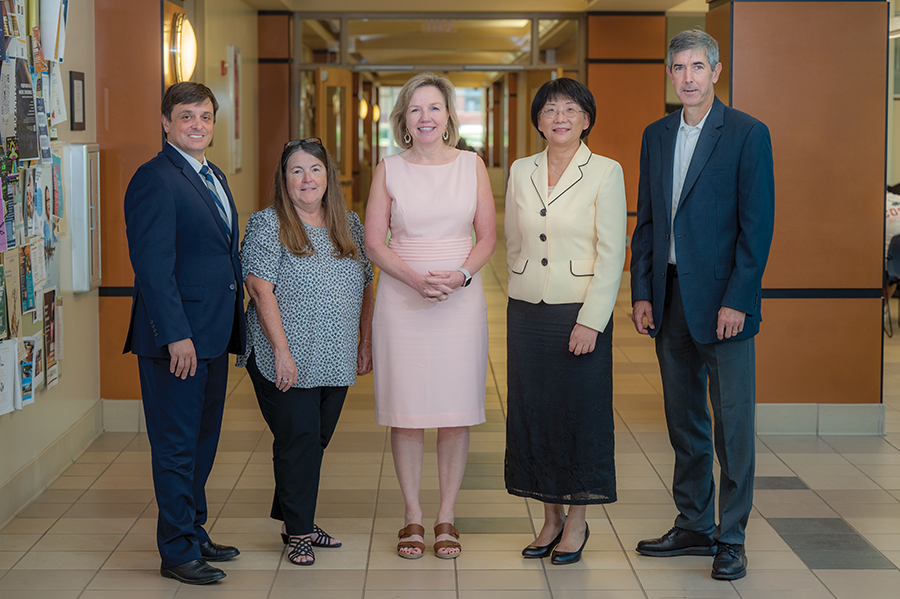
Another area where the provost’s leadership and relationships have helped has been in connecting Waters with Augusta University’s partners outside Georgia. Waters has already made a trip to Scotland for a public health conference and visits to several universities. AU is a partner in the Converge Rural Health Symposium with the University of Aberdeen and Robert Gordon University, both located in Scotland, as well as NHS Education for Scotland.
“Converge is a wonderful, somewhat novel approach to thinking about some of the issues around rural health care and rural health. We always come up with better ideas and better partnerships when we are talking and working with diverse groups of people. We’re going to make them better, and they’re going to make us better. Our collaborations in education and research allow us to think about health in rural areas in new and unique ways,” Waters said.
“It’s also important to note, from the public health perspective, that our rural community partners bring tremendous knowledge and strengths. For example, they have strong relationships with their neighbors, and they take care of each other. I think sometimes we lose that in our more fast-paced urban environment. So how do we partner to build on those strengths so that we can co-create solutions in areas that maybe aren’t working quite as well?”
Waters also sees great potential in the fact that AU houses the Medical College of Georgia, the state’s only public academic medical college. She sees this as an important part of implementing her vision for SPH.
“As a new person coming in, I see that Augusta University is unique as the state’s only public academic health center. We already have a strong foundation of good health care education programs, ground-breaking research, and we are already producing clinicians to serve the needs of the entire state,” Waters said.
“By training some of those clinicians in public health or by bringing public health individuals alongside, we’re going to make our clinicians more effective when they go out to a Georgia community to work. They’re going to not only think about the patient in front of them, which is critical, of course, but also about the community, and how that patient fits in their community. This new lens will support the entire health care team in growing a culture of health within their community. That’s our passion: working collaboratively with community partners to build health in all of its aspects.”
 Augusta University
Augusta University
